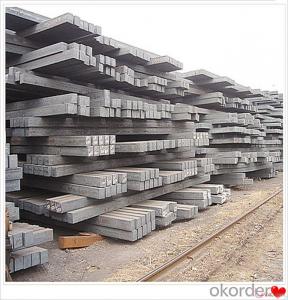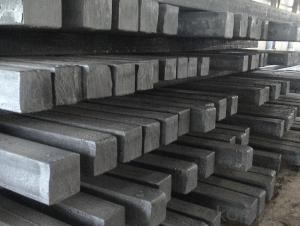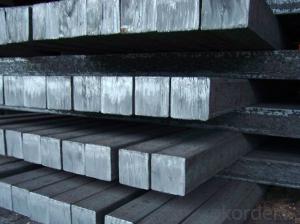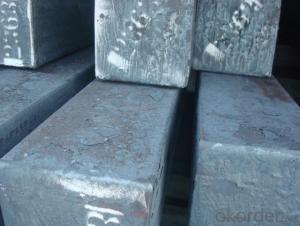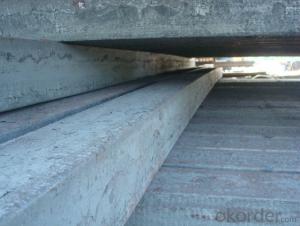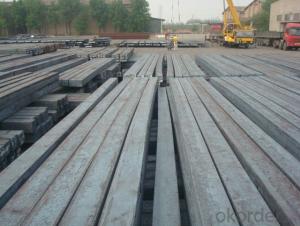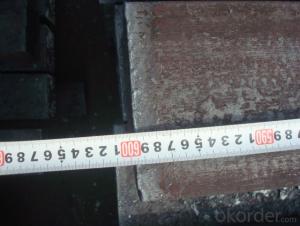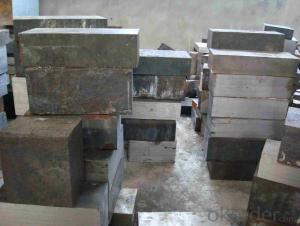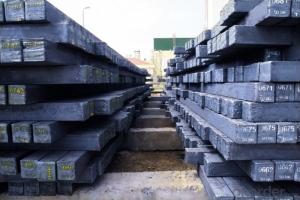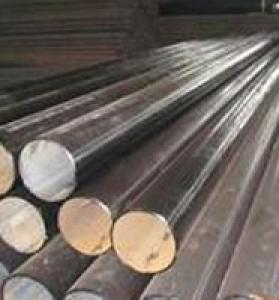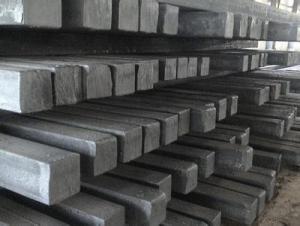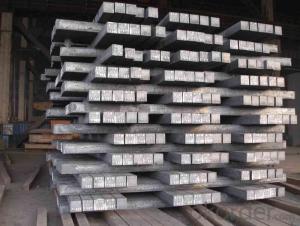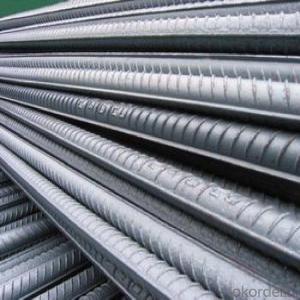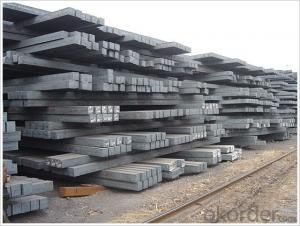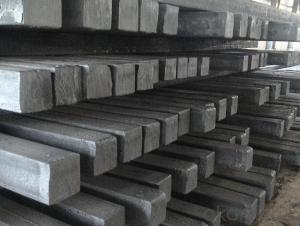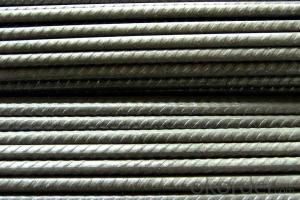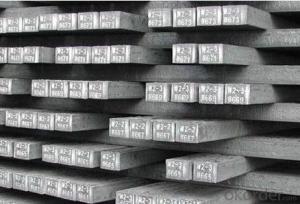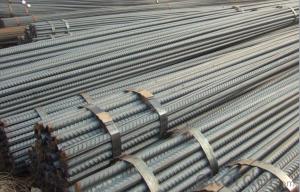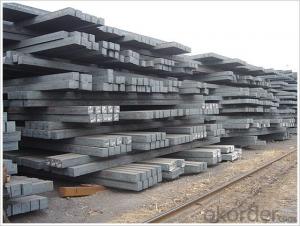120mm Steel Billets Q235 Q275 Q345 Professional Steel
- Loading Port:
- Dalian
- Payment Terms:
- TT OR LC
- Min Order Qty:
- 100 m.t.
- Supply Capability:
- 50000 m.t./month
OKorder Service Pledge
OKorder Financial Service
You Might Also Like
120mm Steel Billets Q235 Q275 Q345 Professional Steel
Description
Reference Price:$260/ton Mn 0.3%-0.6%
Rectangular billet continuous casting billet and mainly general carbon steel, low carbon low silicon cold-rolled material, high quality carbon structural steel, high strength low alloy steel, special steel, etc.
The billet is mainly divided into two kinds from the shape:
Slab: cross section width and height of the ratio of the larger, mainly used for rolling plate.
Billet: equal cross section width and height, or a huge difference, mainly used for rolling steel, wire rod. ,
Steel billets have distinct characteristics as compared with already furnished steel bars and products. Billets have a specific grain structure, which enables the metal to be processed more intricately. Steel billets are also known for their malleability and ductility, especially when exposed to varying temperatures during shaping and molding.
Processing of Steel Billet
Steel billets are considered fresh and raw, and they must undergo a series of manufacturing processes before they can be used for various purposes. Billets are made by means of freezing molten liquid, and are later exposed to extremely low temperatures in order to allow the metal to take shape and solidify in chemical structure. The temperature manipulates the metal's physical properties, and tones its strength and durability. The subsequent processes provide the metal's curved mold design so that it can fit the allotted space provided by other machines, which complete the finishing procedures.
Images
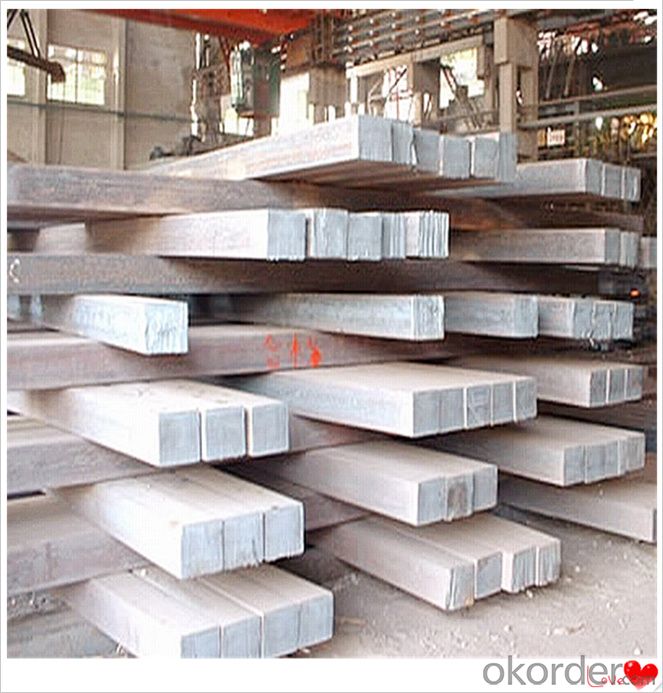
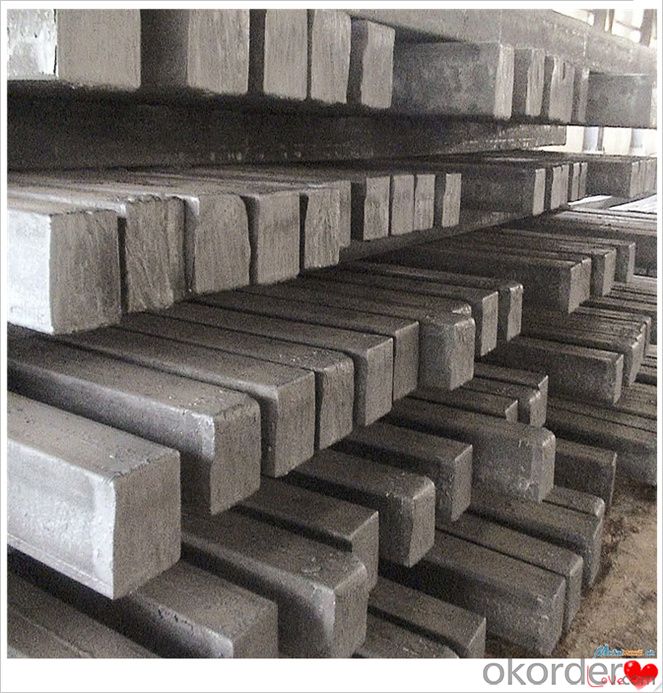
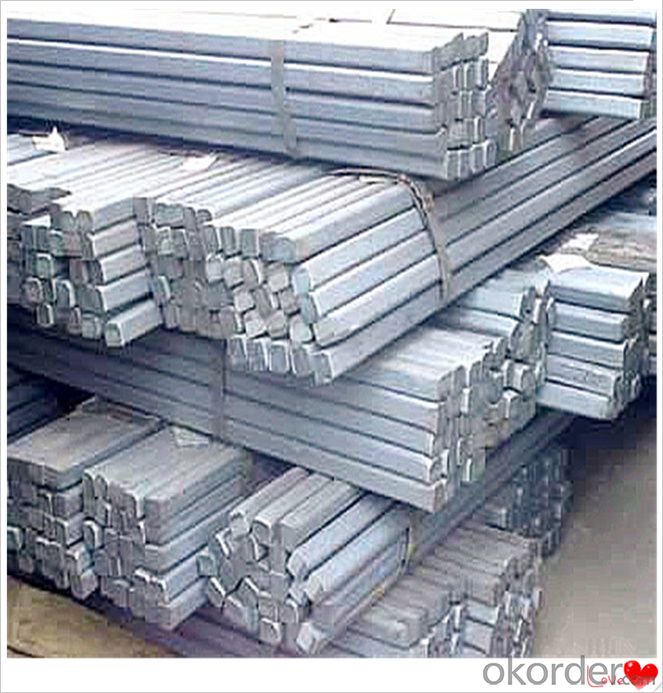
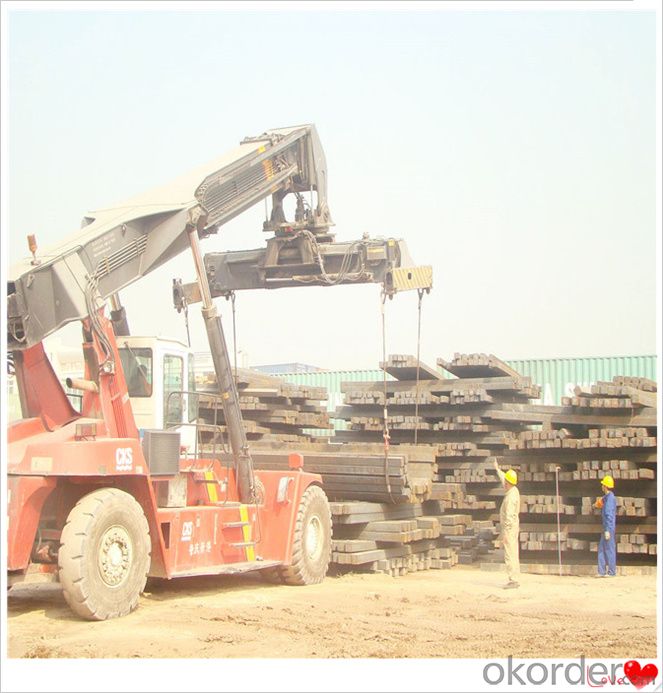
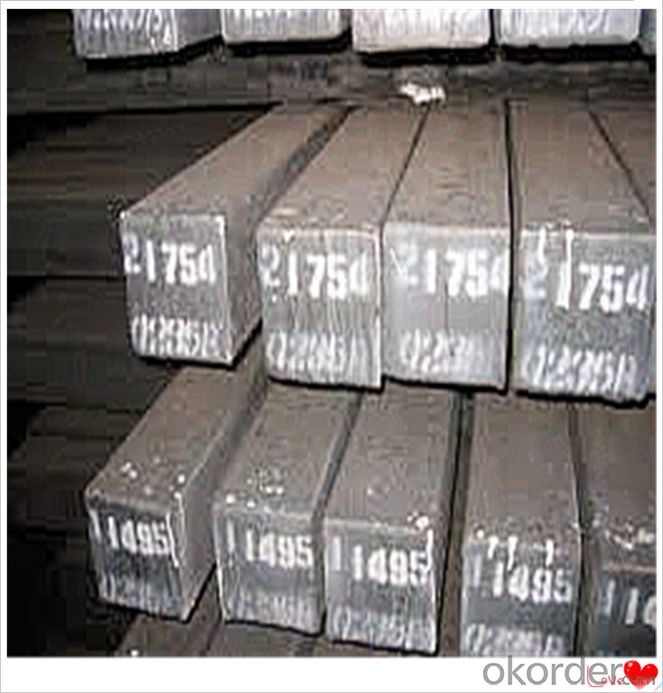
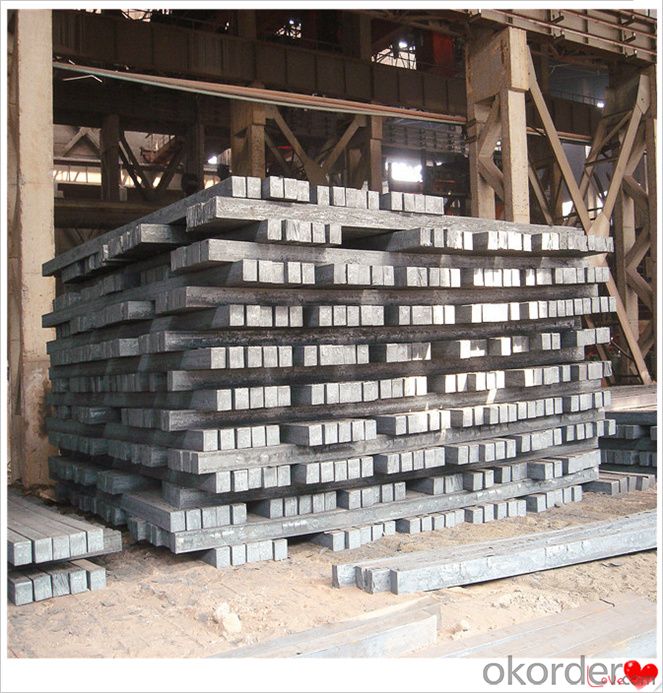
Technical Data
Size:100*100,120*120,150*150,130*130
Mn: 0.3%-0.6%
C: 1%
Cr:0.1%
Packaging
cargo ship or container
usually container price will add 15USD per ton
RFQ
We have organized several common questions for our clients,may help you sincerely:
1) How about your company?
A world class manufacturer & supplier of castings forging in carbon steel and alloy steel,is one of the large-scale professional investment casting production bases in China,consisting of both casting foundry forging and machining factory. Annually more than 8000 tons Precision casting and forging parts are exported to markets in Europe,America and Japan. OEM casting and forging service available according to customer’s requirements.
2) How to guarantee the quality of the products?
We have established the international advanced quality management system,every link from raw material to final product we have strict quality test;We resolutely put an end to unqualified products flowing into the market. At the same time, we will provide necessary follow-up service assurance.
3) How long can we receive the product after purchase?
In the purchase of product within three working days, We will arrange the factory delivery as soon as possible. The pecific time of receiving is related to the state and position of customers.Commonly 7 to 10 working days can be served.
4)Do you have your own QC department?
Yes, we have, our QC department will inspect the goods during the process of mass production and after completion of production.
hot sale!!! steel billets/ mild steel bar/ billet steel
(1): High quality steel with reasonable price.
(2): Wide excellent experiences with after-sale service.
(3): Every process will be checked by responsible QC which insures every product's quality.
(4): Professional packing teams which keep every packing safely.
(5): Trial order can be done in one week.
(6): Samples can be provided as your requirements.
If you are interested in our products, please don't hesitate to contact me.
Your any inquiry will be appreciated and we will offer you a rock-bottom price.
- Q:What is the role of steel billets in the construction of residential buildings?
- Steel billets are an essential component in the construction of residential buildings as they serve as the raw material for manufacturing various structural steel elements. These billets are heated, shaped, and transformed into different forms such as beams, columns, and reinforcing bars, which provide strength and stability to the building's framework. Additionally, steel billets are also used in the fabrication of other critical components like wall panels and roof trusses, ensuring durability and safety in residential construction.
- Q:How are steel billets used in the manufacturing of defense equipment?
- Steel billets are an essential component in the manufacturing of defense equipment due to their strength, durability, and versatility. Defense equipment, such as armored vehicles, tanks, and artillery, requires materials that can withstand extreme conditions and provide optimal protection. Steel billets, which are semi-finished steel products with a square or rectangular cross-section, serve as the raw material for various defense equipment components. These billets are typically melted and cast into specific shapes that meet the precise requirements of each equipment part. Once cast, steel billets are forged, heat-treated, and machined to create different defense equipment components like armor plates, gun barrels, missile casings, and vehicle frames. The high strength and impact resistance of steel billets make them suitable for these applications, ensuring the equipment can withstand ballistic impacts, blast forces, and other hostile conditions encountered in combat situations. Furthermore, steel billets can be easily welded, allowing for the assembly of complex structures and the integration of various components. This flexibility enables the creation of customized defense equipment designed to fulfill specific military needs. In addition to their mechanical properties, steel billets are also corrosion-resistant, which is crucial for defense equipment that may be exposed to harsh environmental conditions, including saltwater or extreme temperatures. This corrosion resistance ensures the longevity and reliability of the equipment, reducing maintenance requirements and costs. Overall, steel billets play a vital role in the manufacturing of defense equipment by providing the necessary strength, durability, and flexibility required for the equipment to perform effectively in combat situations. Their use ensures that defense forces have access to reliable and robust equipment that enhances their operational capabilities and protects the lives of military personnel.
- Q:What are the different types of steel billet inspection equipment?
- There are several types of steel billet inspection equipment, including ultrasonic testing machines, magnetic particle inspection systems, eddy current testing devices, and visual inspection tools. These equipment are used to ensure the quality and integrity of steel billets by detecting any defects or irregularities in their composition, surface, or internal structure.
- Q:How are steel billets used in the manufacturing of pressure vessels?
- Steel billets are an essential component in the manufacturing of pressure vessels. These billets, which are semi-finished metal products, are typically made through a process called casting or extrusion. They are shaped into a solid square or rectangular form, ensuring a consistent and uniform material for further processing. To start the manufacturing process, the steel billets are heated to a specific temperature to make them more malleable and easier to work with. Once heated, they are placed into a forging machine, where they are subjected to intense pressure and shaping. This forging process helps to eliminate any defects or inconsistencies in the billet's structure, resulting in a stronger and more durable material. After forging, the steel billets are further processed through various techniques, such as rolling or machining, to achieve the desired dimensions and shape required for pressure vessel fabrication. These techniques help to refine the billet's surface finish and improve its mechanical properties. Once the billets have been shaped and processed, they are cut into smaller sections, which serve as the building blocks for pressure vessel construction. These sections are then welded together to form the shell of the vessel, ensuring a tight and secure seal to contain the high-pressure fluids or gases. The use of steel billets in pressure vessel manufacturing is crucial because of their superior strength, durability, and resistance to high-pressure environments. The uniformity and consistency of the billets provide a reliable material for fabricating vessels that can withstand extreme conditions and ensure the safety and integrity of the contents within. In summary, steel billets play a vital role in the manufacturing of pressure vessels as they provide the foundation for constructing the vessel's shell. Through a series of heating, forging, and processing techniques, the billets are transformed into strong and durable sections that are then welded together to form the final vessel. The use of steel billets ensures the structural integrity and reliability of pressure vessels, making them suitable for a wide range of industrial applications.
- Q:How are steel billets used in the manufacturing of castings?
- Steel billets are used in the manufacturing of castings as a raw material that is heated and melted to create the molten metal for casting. The billets are then poured into molds to form the desired shape, which is later solidified and cooled to obtain the final casting product.
- Q:How are steel billets used in the manufacturing of consumer goods?
- Steel billets are an essential component in the manufacturing of various consumer goods. These billets are semi-finished steel products that are typically hot-rolled into various shapes, such as bars, rods, or sheets before they are used in the production process. One way steel billets are used in the manufacturing of consumer goods is in the production of automobiles. They are often transformed into different parts of a car's body, such as doors, fenders, or hoods. The strength and durability of steel make it an ideal material for these components, ensuring the safety and longevity of the vehicle. Another significant application of steel billets is in the construction industry. They are commonly used to produce beams, columns, and other structural elements that are crucial for building infrastructure like bridges, buildings, and stadiums. Steel's high tensile strength and ability to withstand heavy loads make it an ideal material for these applications. Steel billets also play a vital role in the manufacturing of appliances and household goods. For instance, they are used to produce refrigerators, washing machines, and ovens, where steel's resistance to corrosion and heat is highly valued. Additionally, steel billets are utilized in the production of furniture, tools, and kitchenware, providing strength and stability to these consumer goods. In the production of consumer goods, steel billets are typically subjected to various processes such as cutting, welding, and shaping to achieve the desired final product. These billets serve as the raw material that undergoes further manufacturing steps, including machining, forging, or casting, to create the specific components or parts needed. Overall, steel billets are an integral part of the manufacturing process for a wide range of consumer goods. The versatility, strength, and durability of steel make it a preferred material in industries such as automotive, construction, appliances, and furniture.
- Q:How are steel billets used in the manufacturing of hydraulic components?
- Hydraulic components rely heavily on steel billets as a crucial raw material for their production. Billets, which are essentially semi-finished steel forms, are typically rectangular or square in shape. They undergo further processing to become various hydraulic components like cylinders, pistons, valves, and fittings. The manufacturing process begins by carefully selecting high-quality steel billets that meet specific mechanical and chemical requirements. These billets are then heated to a specific temperature, making them more malleable and easier to shape. Once heated, the billets undergo a series of mechanical processes such as forging, extrusion, or rolling to achieve the desired shape and size. For instance, in the production of hydraulic cylinders, the heated billets are usually forged or extruded to form the cylinder body. This involves applying high pressure to the billet, causing it to deform and take on a cylindrical shape. The resulting cylinder body is then further machined to precise tolerances to accommodate internal components like pistons, seals, and valves. Similarly, hydraulic valves and fittings are also manufactured using steel billets. The billets undergo various machining techniques such as turning, milling, drilling, and grinding to create intricate shapes and features required for these components. The final products are then subjected to heat treatment or surface treatment to enhance their strength, durability, and corrosion resistance. Steel billets are preferred in the manufacturing of hydraulic components due to their exceptional mechanical properties, including high strength, good ductility, and weldability. These properties ensure that the components can withstand the high pressures, extreme temperatures, and harsh operating conditions commonly experienced in hydraulic systems. In conclusion, steel billets play a vital role in the manufacturing process of hydraulic components. They undergo various mechanical processes to achieve the necessary shapes and sizes needed for cylinders, pistons, valves, and fittings. The use of steel billets guarantees the production of high-quality and reliable hydraulic components that can effectively function in demanding hydraulic systems.
- Q:How are steel billets reheated before rolling or forging?
- Steel billets are reheated before rolling or forging through a process known as billet heating. This process involves subjecting the billets to high temperatures to make them more malleable and easier to shape. There are several methods commonly used for billet heating, including: 1. Furnaces: The most common method of reheating steel billets is through the use of furnaces. These furnaces are typically gas-fired and can reach temperatures of up to 1,200 degrees Celsius. The billets are loaded into the furnace and heated for a specific period of time to achieve the desired temperature. The furnace provides a controlled environment, allowing for even heating and uniformity. 2. Induction heating: Another method used for reheating steel billets is induction heating. This process utilizes electromagnetic induction to heat the billets. An alternating current is passed through a copper coil, creating a magnetic field. The billets are then placed inside the coil, and the magnetic field induces eddy currents within the billets, generating heat. Induction heating offers precise temperature control and rapid heating rates, making it suitable for high-speed production. 3. Electric resistance heating: Electric resistance heating is another technique employed for reheating steel billets. This method involves passing an electric current through the billets, causing them to heat up due to the resistance encountered. Electric resistance heating can be achieved using various types of heating elements, such as graphite electrodes or resistance heating wires. This method offers precise temperature control and is commonly used for smaller-scale operations. Regardless of the heating method used, it is essential to carefully control the temperature and heating time to ensure the billets reach the optimal temperature for rolling or forging. The reheating process allows the steel to become more pliable, reducing its hardness and increasing its ductility, making it easier to shape and form into the desired end product.
- Q:How do steel billets contribute to the water treatment industry?
- Steel billets are used in the water treatment industry to manufacture various components such as pipes, valves, and fittings. These components are vital for the construction and maintenance of water treatment infrastructure. Steel billets provide the necessary strength, durability, and corrosion resistance needed to withstand harsh conditions and chemicals involved in water treatment processes. Thus, steel billets play a crucial role in ensuring the efficiency and longevity of water treatment systems.
- Q:How are steel billets used in the manufacturing of railway components?
- Steel billets are used in the manufacturing of railway components as they serve as the raw material for forging and shaping various parts like rails, wheels, axles, and other structural components. These billets are heated and then manipulated through processes like rolling and forging to obtain the desired shape and strength required for railway applications.
1. Manufacturer Overview |
|
|---|---|
| Location | |
| Year Established | |
| Annual Output Value | |
| Main Markets | |
| Company Certifications | |
2. Manufacturer Certificates |
|
|---|---|
| a) Certification Name | |
| Range | |
| Reference | |
| Validity Period | |
3. Manufacturer Capability |
|
|---|---|
| a)Trade Capacity | |
| Nearest Port | |
| Export Percentage | |
| No.of Employees in Trade Department | |
| Language Spoken: | |
| b)Factory Information | |
| Factory Size: | |
| No. of Production Lines | |
| Contract Manufacturing | |
| Product Price Range | |
Send your message to us
120mm Steel Billets Q235 Q275 Q345 Professional Steel
- Loading Port:
- Dalian
- Payment Terms:
- TT OR LC
- Min Order Qty:
- 100 m.t.
- Supply Capability:
- 50000 m.t./month
OKorder Service Pledge
OKorder Financial Service
Similar products
New products
Hot products
Related keywords
